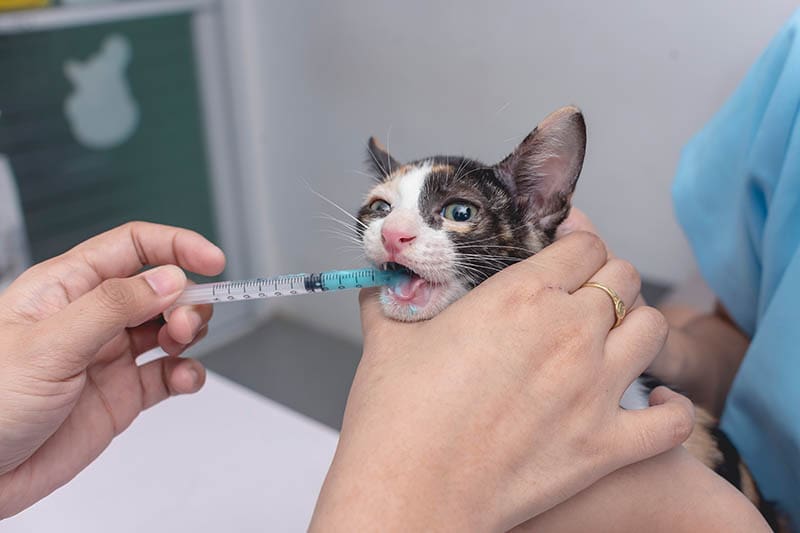Pyrantel Pamoate for Cats: Our Vet Explains Uses, Deworming Tips & FAQ

Updated on

Click to Skip Ahead
Pyrantel is an anthelmintic/dewormer medicine used to treat intestinal worms. It’s important to know that products containing only pyrantel aren’t FDA approved for cats, however, there are many combination products that are. Pyrantel alone can also be prescribed off label by a veterinarian when needed. Because of this, it’s important to always follow your veterinarian’s instructions when giving any pyrantel products to your feline friend.
Deworming your cat is necessary whether they go outside or stay indoors. Indoor cats can still get intestinal worms but will often not need to be dewormed as regularly as an outdoor cat who hunts. Kittens can also be infested soon after birth through their mother’s milk. In general it is recommended that cats are dewormed every 3 months at a minimum.
Certain parasites, such as giardia and roundworms, can be transmitted from cats to humans, so it is crucial to be consistent with your cat’s deworming schedule. Be sure to discuss with your veterinarian how to deworm your cat, including how often and with what medication.
What Is Pyrantel?
Pyrantel pamoate acts on internal parasites from the class of gastrointestinal worms called nematodes that include the following:
- Roundworms (Toxocara cati and Toxascaris leonina)
- Hookworms (Ancylostoma spp.)
- Stomach worms (Physaloptera spp.)
Pyrantel pamoate is not effective against whipworms and tapeworms and so is often combined with other medications in deworming products in order to be a more broad spectrum deworming medication.
The way it works is as a depolarizing neuromuscular blocking agent, this means that it blocks the normal muscle activity of the nematode causing paralysis. Once paralyzed, the worms are then unable to maintain their grip on the gastrointestinal system and are passed out with the feces.

Potential Side Effects of Pyrantel
If pyrantel is administered properly, side effects are rare.
- Nausea
- Vomiting
- Diarrhea
- Lack of appetite
- Lethargy
If nausea and vomiting occurred when you administered the first dose on an empty stomach, give your cat the following doses with food.
Your cat may also experience vomiting and diarrhea when eliminating parasites. If these clinical signs do not disappear within 24 hours or get worse, contact your veterinarian. Pets suffering from other illnesses may experience longer-lasting side effects.
Clinical Signs of Intestinal Parasites in Cats

When cats become infected with intestinal parasites, a certain period must pass (the prepatent period) as the parasite develops to mature stages. It is these mature stages that produce clinical signs.
- Vomiting (sometimes with parasites)
- Coughing up parasites
- Drooling
- Diarrhea or loose stools
- Parasites in the stool
- Mucus in the stool
- Behavioral changes
- Abdominal pain
- Distended abdomen
- Frequent grooming of the anal area
- Weight loss, even if your cat has a good appetite
You must remember that these clinical signs do not necessarily occur in every cat and may vary depending on the parasite. The occurrence of just one of these signs should be a warning that something is wrong with your cat and to contact the vet.
How Often Should I Deworm My Cat?
- Your cat’s age
- The environment in which they live
- How often do they go outside
- Hunting activity
- Flea prevention
- How often they come into contact with wildlife and other cats
It is common to test feces for worms at least twice a year and treat them according to the parasites found.
- Between 2 and 8 weeks, deworming will be repeated at 2-week intervals.
- Between 8 weeks and 6 months, deworming will be carried out monthly.
- After the age of 6 months, deworming should be done every 3 months or twice a year, depending on the individual cat risk factors.
- Cats that live outdoors or are indoor/outdoor must be dewormed once every 1–3 months because they are exposed to a greater risk of being infected with intestinal parasites.
- Cats that live only indoors should be dewormed at least once or twice a year.
Frequently Asked Questions
Does Pyrantel Treat Tapeworms?
No, pyrantel pamoate alone does not kill tapeworms; only drugs containing combined anthelmintics help treat tapeworms. Usually, in addition to pyrantel, these products contain praziquantel. Pyrantel is useful for treating roundworms, some stomach worms, and hookworms.
Can You Give Too Much Pyrantel Pamoate to a Cat?
Yes, you can, and your cat can experience severe side effects. Therefore, you must not give your cat two doses at the same time but give them their regular dose when you remember and then according to the schedule. If you are not sure how much pyrantel pamoate to give your cat, always contact your vet clinic.

Can Cats Overdose on Dewormer?
Yes, cats can overdose on deworming medicine. The most common clinical signs of an overdose in cats are vomiting and diarrhea. However, these two clinical signs can also occur when the intestinal parasites die and are to be eliminated. In more severe cases of intoxication, signs like excessive salivation, convulsions, tremors, and lethargy can also occur. Therefore, it is important to give your cat the dose that was prescribed by the vet and to contact them if clinical signs of an overdose occur.
Sometimes people may use the phrase “you can’t overworm a pet”; this refers to the fact that deworming medications only get rid of the parasites that are present at the time. They do not have a protective effect against further infestations. However, you can definitely overdose on a deworming medication if you don’t follow the instructed dose, method of administration or frequency of administration.
Conclusion
Pyrantel pamoate is a medication that is used to treat intestinal parasites. This medicine is not effective on tapeworms or whipworms, but there are veterinary products that contain pyrantel and another antiparasitic medication in combination that work on a wider number of types of intestinal worms.
If you give the proper dose prescribed by the vet, side effects rarely occur. If you miss a dose, give the next dose when you remember and then follow the usual administration schedule. Do not give two doses at once because you risk intoxicating your pet. If clinical signs occur or if your cat’s behavior changes, contact your veterinarian.
Featured Image Credit: MDV Edwards, Shutterstock













